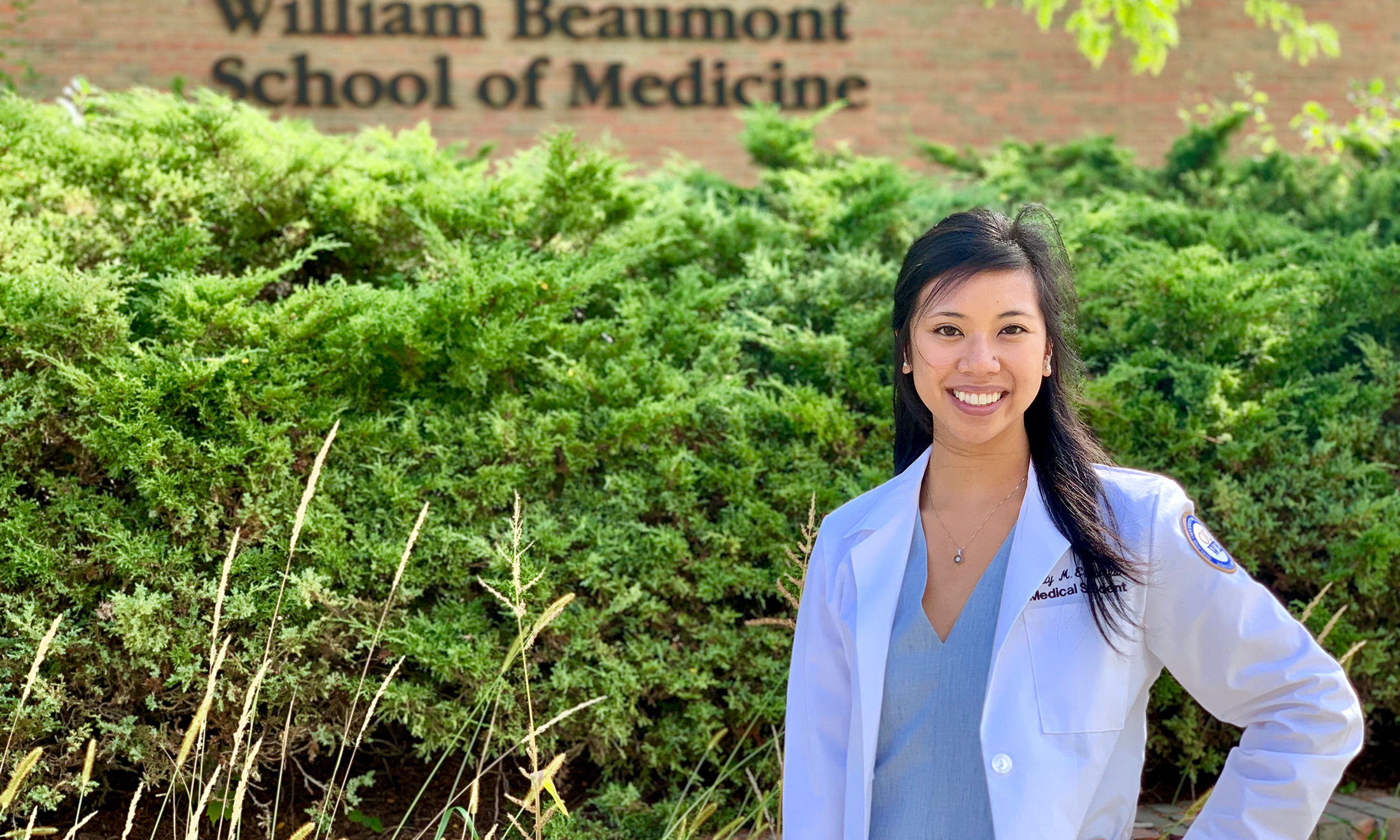- YouTube
- TikTok
Text2StayOnTrack
Pilot study led by OUWB student studies use of text messages in managing diabetes

Second-year medical student, Jody Esguerra, was awarded a prestigious grant for her research study called Text2StayOnTrack.
Second-year medical student Jody Esguerra was one of 17 medical students across the U.S. selected as 2020 Gold Student Summer Fellows by the Arnold P. Gold Foundation. The Oakland University William Beaumont School of Medicine (OUWB) student was awarded the grant for a pilot study to determine if text messages can help low-socioeconomic patients with diabetes improve drug compliance and lifestyle choices.
Each participant received a grant of up to $4,000 for a summer project designed to directly aid underserved communities during the COVID-19 pandemic. Projects were chosen for their focus on populations who are facing health care disparities and are particularly vulnerable during this crisis. Esguerra’s program is called Text2StayOnTrack.
The idea is to use text messages to help patients with type 2 diabetes get a better handle on how they manage medication adherence, diet, physical activity and blood sugar management.
Esguerra says the hope is to not only help patients make better lifestyle choices, but also adhere to social distancing guidelines in light of the COVID-19 pandemic. “I’m excited to be able to do a project that serves a population that I’m passionate about,” says Esguerra. “I’m also excited that it incorporates a platform that a lot of people are already familiar with — and interact with on a daily basis — to address chronic conditions that people struggle with.”
According to the project proposal, type 2 diabetes is a growing problem across the U.S. that disproportionately affects people who are minorities and underserved. In the U.S., it’s estimated that 29.1 million people are affected by the disease.
Further, as one of the most common chronic illnesses, it imposes a substantial burden of disease due to lifelong multi-organ complications that can lead to increased disability and premature death.
The proposal also notes that many people with type 2 diabetes struggle to adhere to behavioral modifications that have been shown to play an important role in glycemic control. according to the proposal, “living with diabetes requires consistent, active engagement of the patient in order to prevent acute complications and minimize long-term adverse effects of the disease.”
Esguerra’s interest in the project can be traced to when she was an undergrad at St. Louis University. That’s where she worked with what she calls “under-resourced populations” as a volunteer at area health care clinics. Her commitment to the population continued when she was pursuing her master’s degree at Loyola University in Chicago, and as a first-year medical student at OUWB. Esguerra is focusing on Text2StayOnTrack for her Embark project — a required scholarly concentration program at OUWB that provides a mentored introduction to research and scholarship
Esguerra is leading the study with help from the Gary Burnstein Community Clinic, a Pontiac-based nonprofit that provides free medical care to the uninsured and has a longstanding relationship with OUWB.
“Part of the intake at Burnstein asks patients if they consent to receive phone calls or text messages from the clinic,” says Esguerra. “Enough patients have consented yes to that form of communication to enable this project to be viable.”
Collaborating with OU
A special text-messaging system had to be developed specific to Text2StayOnTrack. That’s when Esguerra was connected with Oakland University’s Department of Electrical and Computer Engineering.
She worked with Suraj Goyal, a Ph.D. candidate who works in the department’s Intelligent Robotics Lab. The lab’s focus is on socially assistive robots and artificial intelligence for health care. Common application areas are long-term care, older adult care, therapies for children with autism spectrum disorder, and physical therapy.
Together, Esguerra and Goyal developed an automatic text-messaging system so that one person didn’t have to manually type in each and every message.
Esguerra says the messages vary but examples include: diabetes-related trivia designed to determine if a person might need to learn more about the disease; challenges such as “find an activity that helps you relax;” and suggestions for how to incorporate stress-reducing activities into daily life.
Esguerra says the messages would be sent on Sundays, Tuesdays and Fridays during the pilot program to determine the effectiveness of different days without overwhelming users with text messages. She also will study the impact of sending one message a day versus multiple.
She targeted 40 participants in the pilot study. Participants will receive a gift card, which is where the grant money comes in.
To determine the effectiveness of the program, Esguerra will look at several variables: pre- and post-intervention hemoglobin levels; blood pressure; and body mass index (BMI).
“I think it’s more likely that what we’ll see are changes in behavior rather than changes in quantitative measures,” she says. “An intervention like this puts them in connection with their health care provider and motivates them to stay on top of treating their disease.”
Esguerra says she hopes the project can then be studied “with a larger population and for a longer period of time.”
Explore more research opportunities at the Oakland University William Beaumont School of Medicine.


 November 20, 2020
November 20, 2020 By Andrew Dietderich
By Andrew Dietderich

